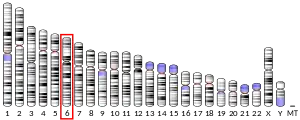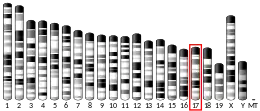TCF19
Transcription factor 19 is a protein that in humans is encoded by the TCF19 gene.[5][6][7]
| TCF19 | |||||||||||||||||||||||||||||||||||||||||||||||||||
|---|---|---|---|---|---|---|---|---|---|---|---|---|---|---|---|---|---|---|---|---|---|---|---|---|---|---|---|---|---|---|---|---|---|---|---|---|---|---|---|---|---|---|---|---|---|---|---|---|---|---|---|
| Identifiers | |||||||||||||||||||||||||||||||||||||||||||||||||||
| Aliases | TCF19, SC1, TCF-19, transcription factor 19 | ||||||||||||||||||||||||||||||||||||||||||||||||||
| External IDs | OMIM: 600912 MGI: 103180 HomoloGene: 5156 GeneCards: TCF19 | ||||||||||||||||||||||||||||||||||||||||||||||||||
| |||||||||||||||||||||||||||||||||||||||||||||||||||
| |||||||||||||||||||||||||||||||||||||||||||||||||||
| |||||||||||||||||||||||||||||||||||||||||||||||||||
| |||||||||||||||||||||||||||||||||||||||||||||||||||
| |||||||||||||||||||||||||||||||||||||||||||||||||||
| Wikidata | |||||||||||||||||||||||||||||||||||||||||||||||||||
| |||||||||||||||||||||||||||||||||||||||||||||||||||
References
- ENSG00000224472, ENSG00000137310, ENSG00000224941, ENSG00000234674, ENSG00000206455, ENSG00000224379 GRCh38: Ensembl release 89: ENSG00000233890, ENSG00000224472, ENSG00000137310, ENSG00000224941, ENSG00000234674, ENSG00000206455, ENSG00000224379 - Ensembl, May 2017
- GRCm38: Ensembl release 89: ENSMUSG00000050410 - Ensembl, May 2017
- "Human PubMed Reference:". National Center for Biotechnology Information, U.S. National Library of Medicine.
- "Mouse PubMed Reference:". National Center for Biotechnology Information, U.S. National Library of Medicine.
- Ku DH, Chang CD, Koniecki J, Cannizzaro LA, Boghosian-Sell L, Alder H, Baserga R (Sep 1991). "A new growth-regulated complementary DNA with the sequence of a putative trans-activating factor". Cell Growth Differ. 2 (4): 179–86. PMID 1868030.
- Krishnan BR, Jamry I, Chaplin DD (Apr 1996). "Feature mapping of the HLA class I region: localization of the POU5F1 and TCF19 genes". Genomics. 30 (1): 53–8. doi:10.1006/geno.1995.0008. PMID 8595903.
- "Entrez Gene: TCF19 transcription factor 19 (SC1)".
Further reading
- Teraoka Y, Naruse TK, Oka A, et al. (2000). "Genetic polymorphisms in the cell growth regulated gene, SC1 telomeric of the HLA-C gene and lack of association of psoriasis vulgaris". Tissue Antigens. 55 (3): 206–11. doi:10.1034/j.1399-0039.2000.550303.x. PMID 10777095.
- Strausberg RL, Feingold EA, Grouse LH, et al. (2003). "Generation and initial analysis of more than 15,000 full-length human and mouse cDNA sequences". Proc. Natl. Acad. Sci. U.S.A. 99 (26): 16899–903. Bibcode:2002PNAS...9916899M. doi:10.1073/pnas.242603899. PMC 139241. PMID 12477932.
- Mungall AJ, Palmer SA, Sims SK, et al. (2003). "The DNA sequence and analysis of human chromosome 6". Nature. 425 (6960): 805–11. Bibcode:2003Natur.425..805M. doi:10.1038/nature02055. PMID 14574404.
- Suzuki Y, Yamashita R, Shirota M, et al. (2004). "Sequence Comparison of Human and Mouse Genes Reveals a Homologous Block Structure in the Promoter Regions". Genome Res. 14 (9): 1711–8. doi:10.1101/gr.2435604. PMC 515316. PMID 15342556.
- Gerhard DS, Wagner L, Feingold EA, et al. (2004). "The Status, Quality, and Expansion of the NIH Full-Length cDNA Project: The Mammalian Gene Collection (MGC)". Genome Res. 14 (10B): 2121–7. doi:10.1101/gr.2596504. PMC 528928. PMID 15489334.
- Kimura K, Wakamatsu A, Suzuki Y, et al. (2006). "Diversification of transcriptional modulation: Large-scale identification and characterization of putative alternative promoters of human genes". Genome Res. 16 (1): 55–65. doi:10.1101/gr.4039406. PMC 1356129. PMID 16344560.
- Shiina T, Ota M, Shimizu S, et al. (2006). "Rapid Evolution of Major Histocompatibility Complex Class I Genes in Primates Generates New Disease Alleles in Humans via Hitchhiking Diversity". Genetics. 173 (3): 1555–70. doi:10.1534/genetics.106.057034. PMC 1526686. PMID 16702430.
This article is issued from Wikipedia. The text is licensed under Creative Commons - Attribution - Sharealike. Additional terms may apply for the media files.



